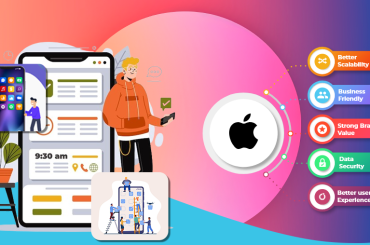The road to the data mines is through cloud business intelligence. With the use of business intelligence solutions, you may gather a wealth of insightful information about your users and other pertinent data. But before cloud BI came into play, large-scale enterprises used BI technologies.
The new oil for corporations is data. Due to technological developments and the widespread use of digitization, businesses now produce enormous amounts of data. Businesses may get insightful information, identify risk factors, and make informed decisions by using the proper data. Making sense of this data is a significant issue for businesses because the majority of the created data is unstructured.
Additionally, the varied and complicated nature of the data necessitates the use of sophisticated and affordable data analytics solutions by enterprises to effectively store, extract, and comprehend this data. Modern cloud data warehousing and Cloud Business Intelligence tools can help businesses overcome these difficulties.
What is Cloud Business Intelligence?

The two technologies of cloud computing and business intelligence are combined to create cloud business intelligence. It simply serves as a means for organizations to obtain important user data using BI tools on cloud infrastructure, which may be accessible via virtual networks in addition to the internet.
Traditional business intelligence methods were not sufficiently scalable to give organizations a smooth experience and answers to any question they could have. Business intelligence was renamed “cloud BI” after being integrated with cloud computing, and it is rather simple to adopt.
Its scalability, performance, and speed are unaffected when utilized by several people since it makes use of cloud infrastructure.
Cloud computing acts as a platform for data such as dashboards, KPIs, and other business analytics in the idea of cloud business intelligence. It enables different firms to utilize BI tools to gather a variety of data.
How does Cloud Computing in Business Intelligence Help Your Company to Grow?
Even while the idea of cloud BI intrigues us all, let’s talk about a few other factors that show why these two technologies work so well together:
-
Cloud BI excels in security.
The security of cloud BI software is generally good. Because of the application’s improved security, data analysts may work with data without involving any other parties. AWS (Amazon Web Services), one of the leading cloud service providers, has the majority of the solutions installed on their platform.
-
Its platform is reasonably priced.
As was already said, traditional business intelligence systems were rather pricey but did not yet include new capabilities. As a result, business intelligence systems were typically linked with massively scaled businesses.
-
Integrate other databases seamlessly
It’s quite simple to integrate business intelligence solutions that operate in the cloud with other databases and programs to give a simple data flow.
Real-time sentiment analysis is performed by business intelligence solutions using data from various social media networks. No matter where you are in the world, you may exchange remote data.
-
Implementation Scalability
The number of users is scaled in and out based on data processing and analysis, with no new hardware or software installations required.
-
Cloud-based business intelligence tools follow current trends.
You should not worry about the upgrades and trends as long as you are utilizing a Cloud BI package. The cloud suppliers who make their cloud BI product often upgrade their offerings.
-
Reduce supplemental wastage
The main benefit is its adaptability, which is shown in its total cost of ownership. Only the services that businesses have used should be paid for.
Also Read – What is the scope and Future of Cloud in the Digital Transformation
Factors to Consider When Adopting Cloud BI Solution
You must be eager to learn about the deployment procedure for cloud business intelligence now that you have read about its main benefits, but have you carefully considered your company’s needs? Have you considered the criteria while choosing cloud business intelligence, albeit it must be reasoned in your mind?
Here, we’ll go through the elements that influence your decision about the kind of cloud deployment strategy you should select:
-
Processing data
What do you intend with your data? Are they real-time, or do they provide data storage and analytics purposes unrelated to real-time information? You must ensure that the following activities are carried out appropriately when it comes to data processing:
- Data should come from a variety of sources.
- Processing data is required to produce insightful analyses.
- Data must be transformed into an easily readable format.
Additionally, you must make sure that BI cloud solutions need appropriate data integration. The cornerstones of appropriate data processing are these ideas.
-
Data synchronization and security
The most important element for the data that will be uploaded to the BI cloud infrastructure is security. Businesses anticipate that their data storage will be transferred to the BI cloud after complying with all applicable legal and auditing requirements; therefore it is important to keep this element in mind beforehand.
-
Seamless BI architecture
Businesses adopt cloud BI architecture as an infrastructure to leverage BI tools and analytics apps. It consists of software and technology for gathering, combining, and analyzing business intelligence data.
-
Selecting a reliable app development company
A capable vendor of cloud computing solutions will guide you through the whole BI implementation process. You should evaluate your professional background and make sure the vendor is qualified to effectively lead you through this project.
Deployment Models of Cloud Business Intelligence

Now that you are aware of the benefits and essential features of cloud-based business intelligence, it is time to comprehend different deployment options. There are typically 4 types of clouds.
-
Public Cloud
The term “public” suggests that several tenants share a single cloud infrastructure. As a result, the cost is shared, making it the most cost-effective choice for cloud BI. It’s a fantastic choice for small and medium-sized organizations with tight budgets or those that manage massive data demands.
-
Personal Cloud
Businesses should choose the private cloud model if they are worried about data security or regulatory compliance. It costs money and offers exclusive storage and computing resources for your business. The cost of deploying the cloud BI system is highest with this method.
-
Hybrid Cloud
The most cost-effective alternative is to use a hybrid cloud deployment if your business can separate the data that needs the highest security standards from the data that doesn’t. For your cloud BI solution, the computing environment combines the benefits of both public and private clouds.
-
Community Cloud
Similar to the private cloud, this cloud architecture assists with computer resources that are often available to other businesses and organizations, but it has fewer users than other cloud infrastructures.
Closing Thoughts
Knowing how the combination of two separate technologies may provide you with a flawless experience is intriguing. An excellent illustration of this is how cloud computing and business intelligence work together.
Companies need cloud business intelligence solutions to manage company operations continuously. Discreet corporate executives have already used Cloud Business Intelligence solutions and given them top attention. Furthermore, conventional BI systems are no longer capable of keeping up with the growth in the size, dynamism, and complexity of data. Cloud Business Intelligence solutions are more crucial than ever for enterprises to deliver the infrastructure, processing power, and agility that the modern digital economy requires.






